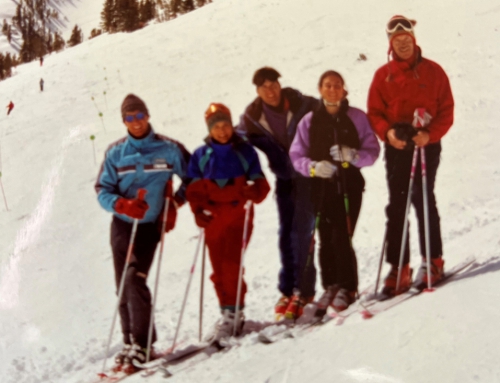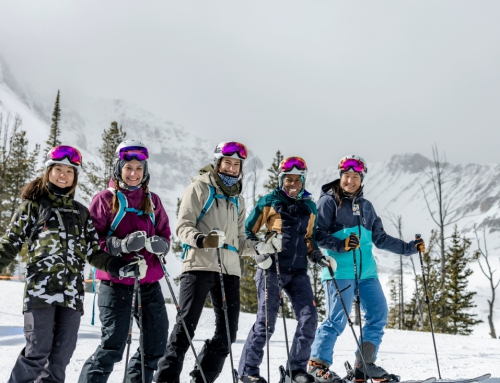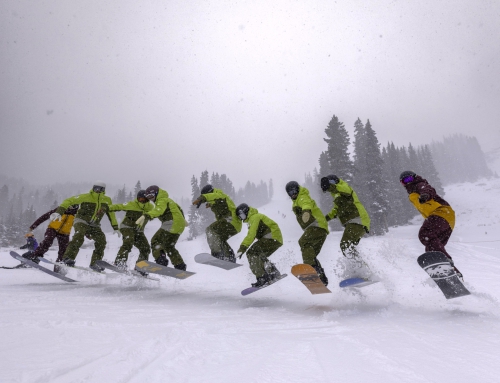12 Tips to Help Snowsports Instructors Survive and Thrive During the Holiday Season
The holidays are a busy time for instructors and can be especially overwhelming if it’s your first season teaching.
As snow pros across the country get ready for the “Christmas Crush” of ski and snowboard lessons, PSIA-AASI Eastern Region Examiner Suzy Chase-Motzkin was generous enough to share her personal experience on how to “Survive and Thrive During the Holiday Season.”
***
The season begins, and just as you’re acclimating to being on the hill again, whammo, the first holiday week comes in hot and heavy. At the resort, it’s all hands on deck, as you try to accommodate the rapid influx of guests. Here are some tips to help you cope with the transition.
Prior to the Holiday Rush
1. Get your bills paid and mail sent. The resort day starts early and ends after banking and postal hours, so anticipate what will need to be done. Those who are full time have only one day a week to take care of life’s business. This can get even trickier for the weekend warriors who have careers outside the ski and ride business.
2. Get a Venmo account. Nobody seems to carry cash anymore. Rather than forgo the offer of a tip, make sure you have a Venmo account so people can send money. Make it easy for them by having a business card with the account info (username, email, or phone number). If you don’t have time to order cards through printing services like VistaPrint, get a small memo pad and write your resort name, your name, and Venmo info on the top of the page, then jot down some coaching reminders for your students. If they hadn’t thought of tipping you, the card or paper with your notes will help. Plus, it will be easier for them to tell their friends about you or request you for a private lesson in the future.
3. Get your shopping done. Try to plan your meals for the busy period and shop accordingly. Be sure to include peanut butter and jelly and protein or energy bars in your pocket! If you have room in the freezer, premake some dinners you can pop in the microwave or oven when you get home from your busy day on the hill. For premade breakfasts, hard-boil eggs and precook bacon you can easily reheat. Or make muffin-sized frittatas or quiches. You can freeze them or keep them in the fridge for up to a week. Make sure you eat protein in the morning. Carbs break down quickly, and you’ll be starving by mid-morning if all you’ve had is a bagel.
4. Tune up your equipment. Make sure your boards are waxed and in good shape, but even more important is that your boots are comfy enough to be in all day. If you are in new boots that are not quite broken in, try putting your old bladders in them when you know it’s going to be a long day.
5. Pre-pack your gear bag. There’s nothing worse than getting to the mountain and missing that buff, glove, or extra layer. Put everything together the night before and keep it by the door. If you have kids to get going in the morning, this is even more urgent.
During the Holiday Rush
6. Get up a bit earlier. Even if you were up late the night before, adding extra time in the morning can set you up for a much calmer day. You will have more time to connect with fellow staffers, have a relaxing cup of coffee or tea, and be able to take care of equipment modifications. Your managers/supervisors will be more relaxed knowing you are there and ready for your assignments, and you might even have time to take a run or two before it gets busy.
7. Bring your lunch instead of waiting in line for it. A peanut butter and jelly sandwich on multigrain bread does wonders to tide you over through the afternoon. You can even keep it in your pocket. Not only does it save you money, it also saves your break time.
8. Double your neckie. Single neck gaiters can get damp either from snow(making) or the condensation from warm breath into the cold air. Once damp, they get stiff and cold. You can have double protection with your uniform collar, but the collar really muffles your voice, which makes communicating with students difficult in the elements. If you wear two neck layers, the outer one can get wet and snowy and the inner one will stay dry and less abrasive to the face. It’s easier to lower them to speak with your students. If the weather is super nasty, you can spin them around at your lunch break.
9. Change your socks on your lunch break. Change in temperatures creates condensation in your boots. Damp socks make for a very uncomfortable afternoon. A fresh pair of socks is a real game changer!
10. Socialize. File this under misery loves company. Get together with other snow pros and share some laughs. Everyone has a story about something that happened during their day that others can relate to. Not only does this time help you decompress, it helps you create lifelong friendships. Make arrangements with fellow staff members to each host a potluck. It doesn’t need to be in a big or fancy space. Easting at the resort can get expensive, but when everyone contributes, you can have a great time at only a small portion of the cost. Be sure to include staff newbies. Send the leftovers home with the younger folks who are struggling to make ends meet or bring leftover food to the pro room to share at lunch the next day.
11. Take care of yourself. It’s easy to get run down when you are physically active and giving it your all while teaching. Boost your immune system with vitamins and drink lots of water. It’s easy to get dehydrated with all the activity. Coffee and tea, though fluids, will aid in dehydration. Keep a water bottle with you and drink every time you get a break.
Keep your hands washed. If you have to put your hands on a stair railing, open a door, or lower a safety bar, there might be germs lurking, so be careful wiping your nose with your gloves. Keep extra tissues in your pocket because parents bring sick kids to the mountain. Avoid wiping their noses. Instead, hand them a tissue if they need it and have them put the tissue in their own pocket. Also be aware when helping them with their gloves or mittens, which can be germ petri dishes.
12. Frame and reframe your mindset. There is light at the end of a busy holiday tunnel. This is seasonal work, and it’s over before you know it. I always say, “Get while the gettin’s gettin’,” because the gravy train pulls out of the station when the weather changes. It’s important to understand how much guests’ vacation time means to them and what a huge investment it is for them.
Your attitude and enthusiasm need to be infectious (in a good way) from beginning to end. If you can spark joy and build confidence in their lives, you have contributed significantly. Think of framing your job, as instructor or coach, as being of utmost importance to those with whom you come in contact. Your circle of influence is greater than you can imagine. You can transform personalities, while building technical skills. You will often live in their memories for years to come, so leave them fulfilled. In doing so, you will fill your own soul with positivity.
Suzy Chase-Motzkin has been mostly full time in the ski business since 1976 and has been an examiner since 1989.







